Analysis of Ho Chi Minh's Declaration of Independence: History Essay
VerifiedAdded on 2020/03/16
|5
|1011
|680
Essay
AI Summary
This history essay analyzes Ho Chi Minh's Declaration of Independence, focusing on the historical context of Vietnam's struggle against French and Japanese oppression during World War II. The essay examines the services Vietnam provided to the Allies, particularly in gathering intelligence against Japan, and how Ho Chi Minh framed Vietnam's claim for independence based on the principles of equality and freedom. It highlights the atrocities committed by the French, including political and economic oppression, which justified Vietnam's fight for self-determination. The essay concludes by emphasizing Vietnam's role in the war and the international community's involvement in the process of securing its freedom. The analysis draws on Ho Chi Minh's speech and relevant historical sources to provide a comprehensive understanding of the events and their significance.
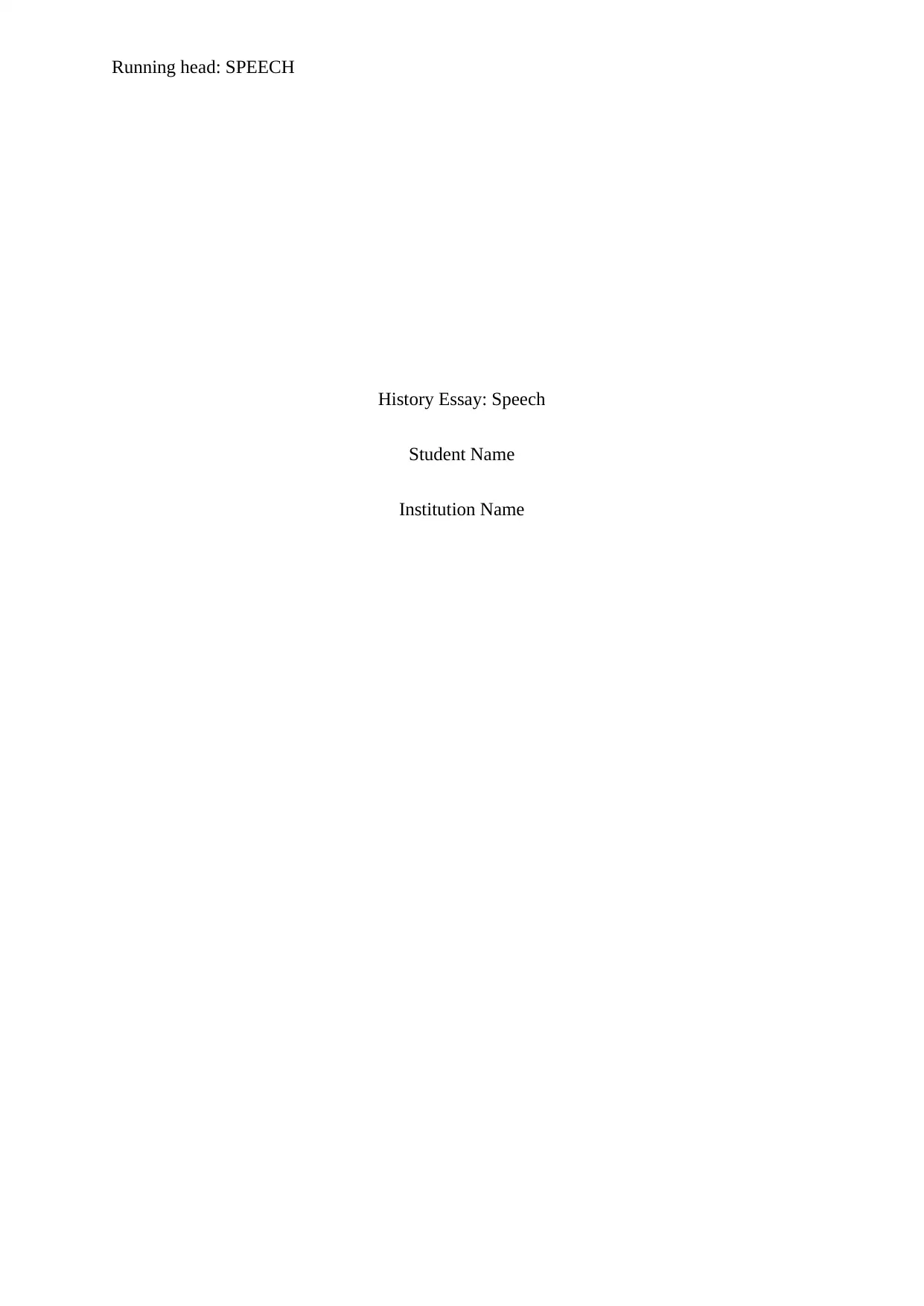
Running head: SPEECH
History Essay: Speech
Student Name
Institution Name
History Essay: Speech
Student Name
Institution Name
Paraphrase This Document
Need a fresh take? Get an instant paraphrase of this document with our AI Paraphraser
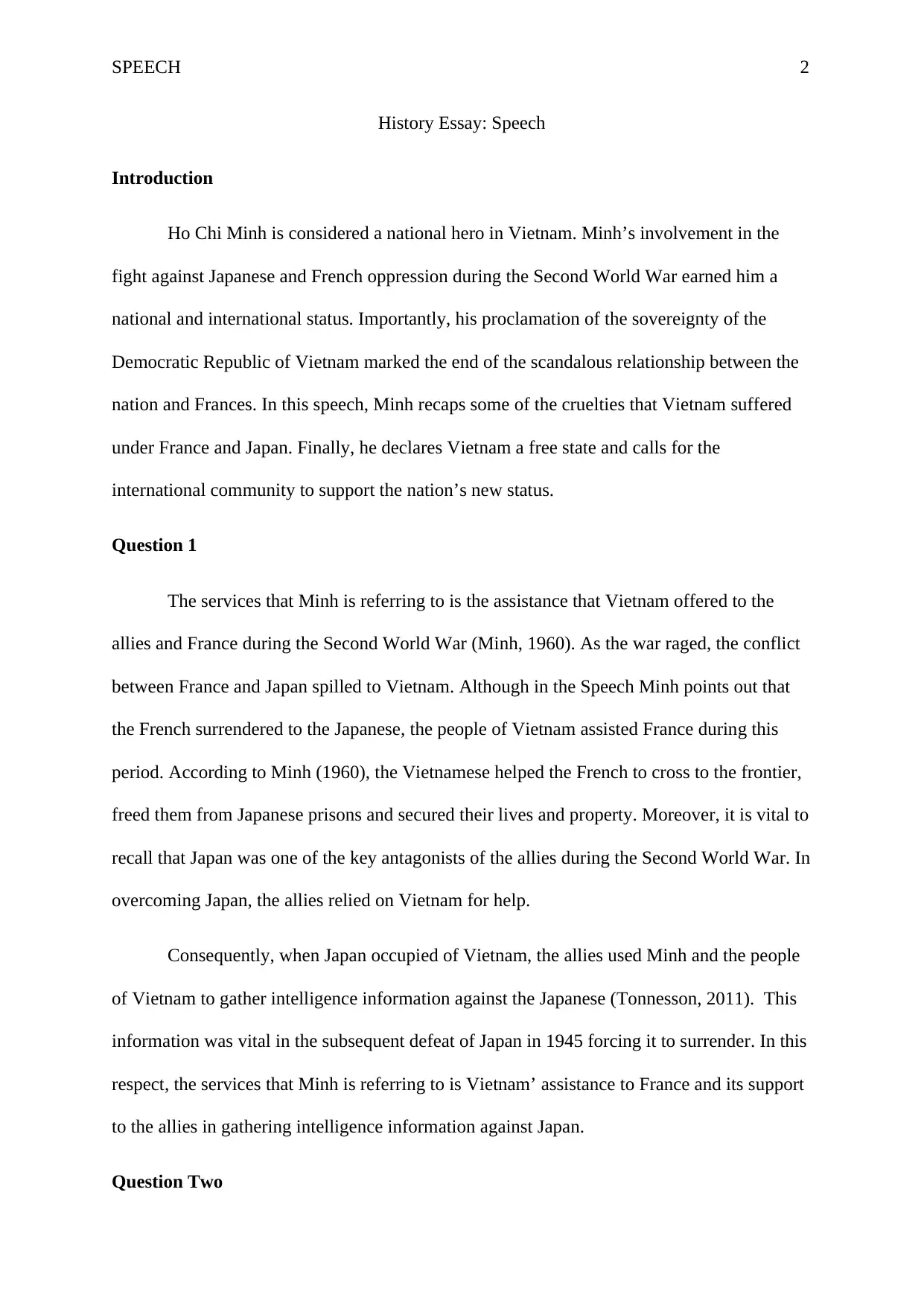
SPEECH 2
History Essay: Speech
Introduction
Ho Chi Minh is considered a national hero in Vietnam. Minh’s involvement in the
fight against Japanese and French oppression during the Second World War earned him a
national and international status. Importantly, his proclamation of the sovereignty of the
Democratic Republic of Vietnam marked the end of the scandalous relationship between the
nation and Frances. In this speech, Minh recaps some of the cruelties that Vietnam suffered
under France and Japan. Finally, he declares Vietnam a free state and calls for the
international community to support the nation’s new status.
Question 1
The services that Minh is referring to is the assistance that Vietnam offered to the
allies and France during the Second World War (Minh, 1960). As the war raged, the conflict
between France and Japan spilled to Vietnam. Although in the Speech Minh points out that
the French surrendered to the Japanese, the people of Vietnam assisted France during this
period. According to Minh (1960), the Vietnamese helped the French to cross to the frontier,
freed them from Japanese prisons and secured their lives and property. Moreover, it is vital to
recall that Japan was one of the key antagonists of the allies during the Second World War. In
overcoming Japan, the allies relied on Vietnam for help.
Consequently, when Japan occupied of Vietnam, the allies used Minh and the people
of Vietnam to gather intelligence information against the Japanese (Tonnesson, 2011). This
information was vital in the subsequent defeat of Japan in 1945 forcing it to surrender. In this
respect, the services that Minh is referring to is Vietnam’ assistance to France and its support
to the allies in gathering intelligence information against Japan.
Question Two
History Essay: Speech
Introduction
Ho Chi Minh is considered a national hero in Vietnam. Minh’s involvement in the
fight against Japanese and French oppression during the Second World War earned him a
national and international status. Importantly, his proclamation of the sovereignty of the
Democratic Republic of Vietnam marked the end of the scandalous relationship between the
nation and Frances. In this speech, Minh recaps some of the cruelties that Vietnam suffered
under France and Japan. Finally, he declares Vietnam a free state and calls for the
international community to support the nation’s new status.
Question 1
The services that Minh is referring to is the assistance that Vietnam offered to the
allies and France during the Second World War (Minh, 1960). As the war raged, the conflict
between France and Japan spilled to Vietnam. Although in the Speech Minh points out that
the French surrendered to the Japanese, the people of Vietnam assisted France during this
period. According to Minh (1960), the Vietnamese helped the French to cross to the frontier,
freed them from Japanese prisons and secured their lives and property. Moreover, it is vital to
recall that Japan was one of the key antagonists of the allies during the Second World War. In
overcoming Japan, the allies relied on Vietnam for help.
Consequently, when Japan occupied of Vietnam, the allies used Minh and the people
of Vietnam to gather intelligence information against the Japanese (Tonnesson, 2011). This
information was vital in the subsequent defeat of Japan in 1945 forcing it to surrender. In this
respect, the services that Minh is referring to is Vietnam’ assistance to France and its support
to the allies in gathering intelligence information against Japan.
Question Two
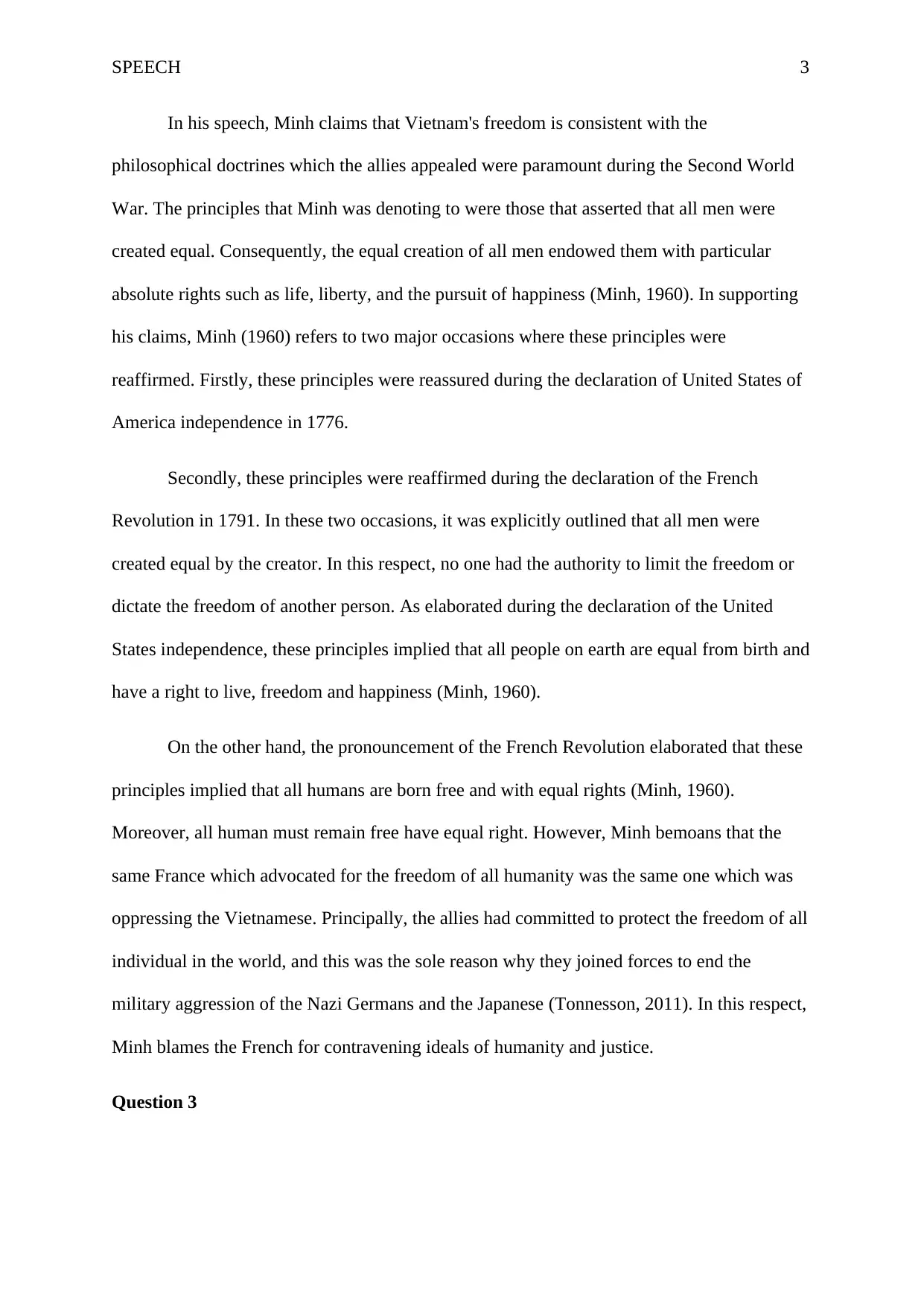
SPEECH 3
In his speech, Minh claims that Vietnam's freedom is consistent with the
philosophical doctrines which the allies appealed were paramount during the Second World
War. The principles that Minh was denoting to were those that asserted that all men were
created equal. Consequently, the equal creation of all men endowed them with particular
absolute rights such as life, liberty, and the pursuit of happiness (Minh, 1960). In supporting
his claims, Minh (1960) refers to two major occasions where these principles were
reaffirmed. Firstly, these principles were reassured during the declaration of United States of
America independence in 1776.
Secondly, these principles were reaffirmed during the declaration of the French
Revolution in 1791. In these two occasions, it was explicitly outlined that all men were
created equal by the creator. In this respect, no one had the authority to limit the freedom or
dictate the freedom of another person. As elaborated during the declaration of the United
States independence, these principles implied that all people on earth are equal from birth and
have a right to live, freedom and happiness (Minh, 1960).
On the other hand, the pronouncement of the French Revolution elaborated that these
principles implied that all humans are born free and with equal rights (Minh, 1960).
Moreover, all human must remain free have equal right. However, Minh bemoans that the
same France which advocated for the freedom of all humanity was the same one which was
oppressing the Vietnamese. Principally, the allies had committed to protect the freedom of all
individual in the world, and this was the sole reason why they joined forces to end the
military aggression of the Nazi Germans and the Japanese (Tonnesson, 2011). In this respect,
Minh blames the French for contravening ideals of humanity and justice.
Question 3
In his speech, Minh claims that Vietnam's freedom is consistent with the
philosophical doctrines which the allies appealed were paramount during the Second World
War. The principles that Minh was denoting to were those that asserted that all men were
created equal. Consequently, the equal creation of all men endowed them with particular
absolute rights such as life, liberty, and the pursuit of happiness (Minh, 1960). In supporting
his claims, Minh (1960) refers to two major occasions where these principles were
reaffirmed. Firstly, these principles were reassured during the declaration of United States of
America independence in 1776.
Secondly, these principles were reaffirmed during the declaration of the French
Revolution in 1791. In these two occasions, it was explicitly outlined that all men were
created equal by the creator. In this respect, no one had the authority to limit the freedom or
dictate the freedom of another person. As elaborated during the declaration of the United
States independence, these principles implied that all people on earth are equal from birth and
have a right to live, freedom and happiness (Minh, 1960).
On the other hand, the pronouncement of the French Revolution elaborated that these
principles implied that all humans are born free and with equal rights (Minh, 1960).
Moreover, all human must remain free have equal right. However, Minh bemoans that the
same France which advocated for the freedom of all humanity was the same one which was
oppressing the Vietnamese. Principally, the allies had committed to protect the freedom of all
individual in the world, and this was the sole reason why they joined forces to end the
military aggression of the Nazi Germans and the Japanese (Tonnesson, 2011). In this respect,
Minh blames the French for contravening ideals of humanity and justice.
Question 3
⊘ This is a preview!⊘
Do you want full access?
Subscribe today to unlock all pages.

Trusted by 1+ million students worldwide
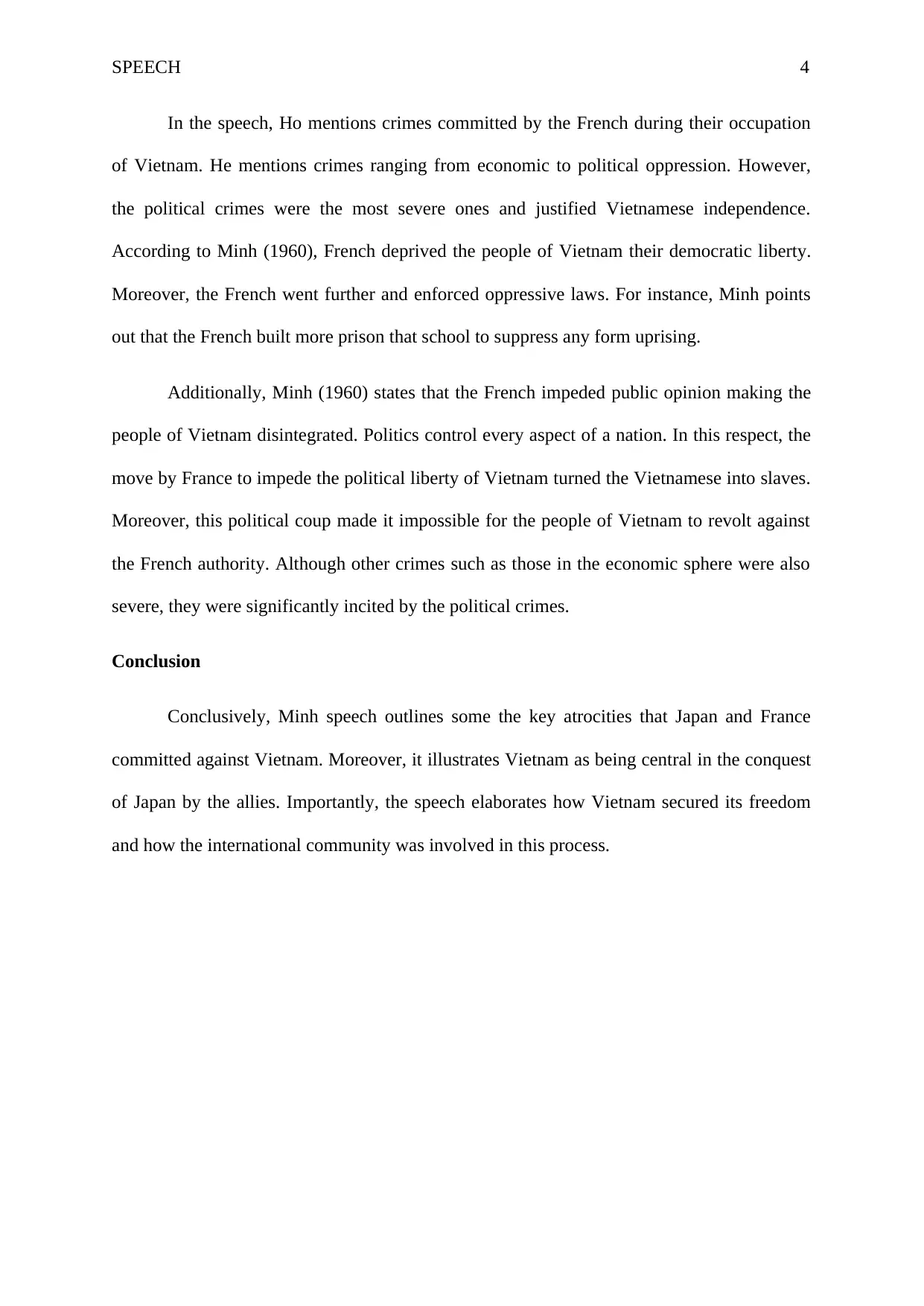
SPEECH 4
In the speech, Ho mentions crimes committed by the French during their occupation
of Vietnam. He mentions crimes ranging from economic to political oppression. However,
the political crimes were the most severe ones and justified Vietnamese independence.
According to Minh (1960), French deprived the people of Vietnam their democratic liberty.
Moreover, the French went further and enforced oppressive laws. For instance, Minh points
out that the French built more prison that school to suppress any form uprising.
Additionally, Minh (1960) states that the French impeded public opinion making the
people of Vietnam disintegrated. Politics control every aspect of a nation. In this respect, the
move by France to impede the political liberty of Vietnam turned the Vietnamese into slaves.
Moreover, this political coup made it impossible for the people of Vietnam to revolt against
the French authority. Although other crimes such as those in the economic sphere were also
severe, they were significantly incited by the political crimes.
Conclusion
Conclusively, Minh speech outlines some the key atrocities that Japan and France
committed against Vietnam. Moreover, it illustrates Vietnam as being central in the conquest
of Japan by the allies. Importantly, the speech elaborates how Vietnam secured its freedom
and how the international community was involved in this process.
In the speech, Ho mentions crimes committed by the French during their occupation
of Vietnam. He mentions crimes ranging from economic to political oppression. However,
the political crimes were the most severe ones and justified Vietnamese independence.
According to Minh (1960), French deprived the people of Vietnam their democratic liberty.
Moreover, the French went further and enforced oppressive laws. For instance, Minh points
out that the French built more prison that school to suppress any form uprising.
Additionally, Minh (1960) states that the French impeded public opinion making the
people of Vietnam disintegrated. Politics control every aspect of a nation. In this respect, the
move by France to impede the political liberty of Vietnam turned the Vietnamese into slaves.
Moreover, this political coup made it impossible for the people of Vietnam to revolt against
the French authority. Although other crimes such as those in the economic sphere were also
severe, they were significantly incited by the political crimes.
Conclusion
Conclusively, Minh speech outlines some the key atrocities that Japan and France
committed against Vietnam. Moreover, it illustrates Vietnam as being central in the conquest
of Japan by the allies. Importantly, the speech elaborates how Vietnam secured its freedom
and how the international community was involved in this process.
Paraphrase This Document
Need a fresh take? Get an instant paraphrase of this document with our AI Paraphraser
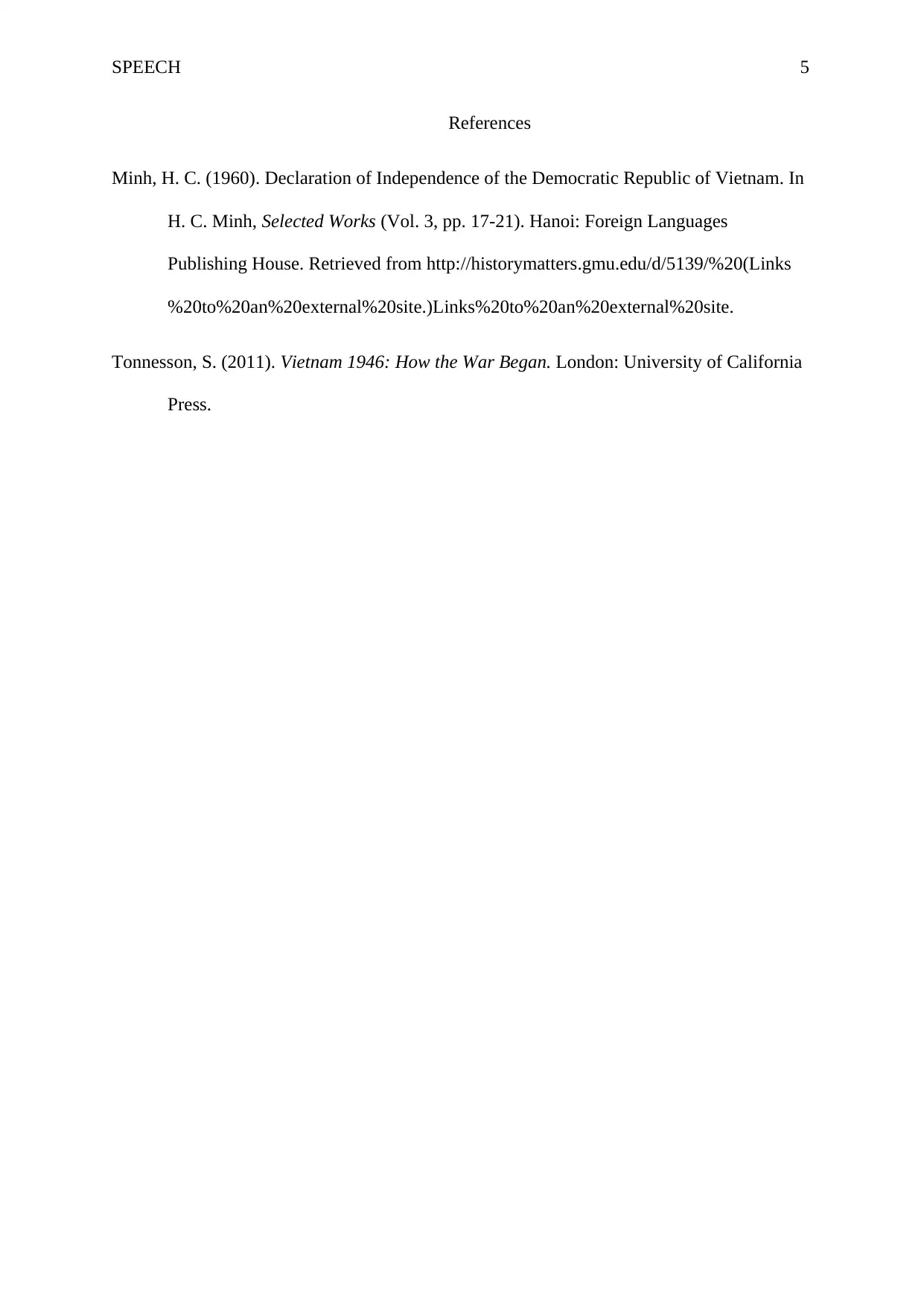
SPEECH 5
References
Minh, H. C. (1960). Declaration of Independence of the Democratic Republic of Vietnam. In
H. C. Minh, Selected Works (Vol. 3, pp. 17-21). Hanoi: Foreign Languages
Publishing House. Retrieved from http://historymatters.gmu.edu/d/5139/%20(Links
%20to%20an%20external%20site.)Links%20to%20an%20external%20site.
Tonnesson, S. (2011). Vietnam 1946: How the War Began. London: University of California
Press.
References
Minh, H. C. (1960). Declaration of Independence of the Democratic Republic of Vietnam. In
H. C. Minh, Selected Works (Vol. 3, pp. 17-21). Hanoi: Foreign Languages
Publishing House. Retrieved from http://historymatters.gmu.edu/d/5139/%20(Links
%20to%20an%20external%20site.)Links%20to%20an%20external%20site.
Tonnesson, S. (2011). Vietnam 1946: How the War Began. London: University of California
Press.
1 out of 5
Related Documents
Your All-in-One AI-Powered Toolkit for Academic Success.
+13062052269
info@desklib.com
Available 24*7 on WhatsApp / Email
![[object Object]](/_next/static/media/star-bottom.7253800d.svg)
Unlock your academic potential
Copyright © 2020–2026 A2Z Services. All Rights Reserved. Developed and managed by ZUCOL.




